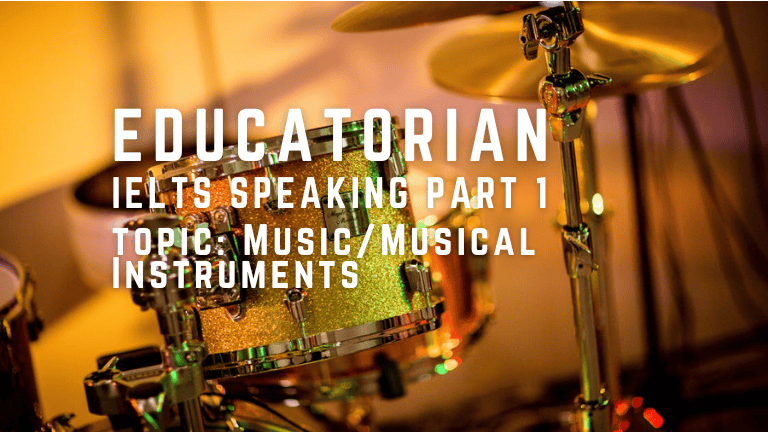
IELTS Speaking Part 1 – Music Musical Instruments
IELTS Speaking Part 1 (Music / Musical Instruments)
Topic: Music Musical Instruments
Difficulty: Medium
IELTS Speaking Part 1 – Music / Musical Instruments
- Do schools in your country have music lessons?
- Do a lot of people like music?
- Do you think music education is important for children?
- Do you think children should learn to play an instrument at school?
- What musical instruments do you enjoy listening to the most?
- Have you ever learned to play a musical instrument?
Do schools in your country have music lessons?
Aya (High School Student)
Absolutely! Most schools offer music lessons as part of their curriculum. In my school, we have weekly classes where we explore different genres and learn about music theory. It’s a fantastic way to express creativity and relax from the stress of academics. Music brings everyone together, and I believe it enriches our education.
Minho (University Student)
Yes, schools in my country generally include music lessons, but it varies from one institution to another. Some focus heavily on music education, while others offer it as an elective. Personally, I think it’s crucial for students to have access to music lessons because they provide a creative outlet that complements traditional learning.
Linh (Office Worker)
Not all schools have dedicated music lessons. While some schools incorporate music into their programs, others prioritize academic subjects. I think it’s unfortunate because music can enhance students’ cognitive skills and emotional well-being. Ideally, every school should have a structured music program.
Mr. Wong (Retired English Teacher)
Yes, music lessons exist in many schools, but the emphasis placed on them can be inconsistent. Some institutions offer robust programs, while others barely scratch the surface. In my experience, schools that prioritize music education foster a more well-rounded development in their students.
Do a lot of people like music?
Aya (High School Student)
Definitely! I think most people enjoy music in various forms. Whether it’s pop, rock, or classical, there’s something for everyone. At my school, music is a big part of social gatherings, and it connects students from different backgrounds. It’s interesting to see how music influences trends and creates community.
Minho (University Student)
Absolutely! Music seems to resonate with nearly everyone. From what I observe, people often bond over their favorite songs and artists. Music festivals and concerts are always packed, showcasing the universal love for music. I believe it plays a vital role in our cultural identity.
Linh (Office Worker)
Yes, a lot of people appreciate music, but not everyone is passionate about it. While many enjoy listening to their favorite songs, some may not actively seek out music in their daily lives. It’s fascinating how personal preferences can shape our experiences with music.
Mr. Wong (Retired English Teacher)
Indeed, many people have a fondness for music. It serves as a powerful form of expression and often evokes strong emotions. However, I’ve noticed some individuals are indifferent to it. They may enjoy a tune now and then, but they don’t actively seek out music in their lives.
Do you think music education is important for children?
Aya (High School Student)
Absolutely! Music education plays a crucial role in a child’s development. It encourages creativity and helps improve memory and concentration. I’ve seen how it enhances my classmates’ confidence when performing. Music education fosters teamwork and discipline, which are valuable life skills.
Minho (University Student)
I believe music education is incredibly important. It provides children with the opportunity to express themselves artistically. Music also promotes cognitive development and can help improve academic performance in other subjects. Investing in music education is investing in a well-rounded education.
Linh (Office Worker)
While I see the value in music education, I think it should not overshadow core subjects. Children need a balanced education, and while music has its benefits, it should not be mandatory. Some children might thrive better in other areas. It’s essential to focus on individual strengths.
Mr. Wong (Retired English Teacher)
Yes, music education is vital for children’s growth. It nurtures creativity and emotional expression. Moreover, studies indicate that music can enhance language skills and math abilities. However, I understand that some might view it as less critical than core subjects, which is a shame.
Do you think children should learn to play an instrument at school?
Aya (High School Student)
Definitely! Learning an instrument can be a rewarding experience. It teaches discipline and perseverance, qualities that are beneficial in all areas of life. Plus, it’s so much fun to collaborate with others in a band or orchestra. I believe every child should have the chance to explore this!
Minho (University Student)
I think it’s a fantastic idea for children to learn an instrument at school. It can significantly enhance their cognitive skills and boost self-esteem. However, I understand that not every child will enjoy it or excel at it, which should be considered when designing school programs.
Linh (Office Worker)
While I see some benefits to learning an instrument, I don’t think it should be a requirement for all children. Not every child is musically inclined, and forcing them to play an instrument might lead to frustration. Instead, schools should offer it as an elective.
Mr. Wong (Retired English Teacher)
Absolutely, children should learn to play an instrument in school. It opens doors to musical understanding and appreciation. Playing an instrument also promotes teamwork and collaboration, especially in group settings. However, I acknowledge that some children might have other interests that deserve equal attention.
What musical instruments do you enjoy listening to the most?
Aya (High School Student)
I really enjoy listening to the guitar and piano. The guitar brings so much energy to songs, while the piano has a soothing quality that I love. Whether it’s in pop songs or classical pieces, these instruments always resonate with me. They add layers of emotion and depth to music.
Minho (University Student)
I’m particularly fond of the violin and drums. The violin creates such beautiful melodies that evoke powerful emotions. On the other hand, drums bring rhythm and energy to any piece. Together, they create a dynamic sound that captivates me every time I hear them.
Linh (Office Worker)
I appreciate the sound of the saxophone and the acoustic guitar. The saxophone has a jazzy vibe that makes everything feel more sophisticated. Meanwhile, acoustic guitar music is often relaxing and perfect for unwinding after a long day at work. Both instruments hold a special place in my heart.
Mr. Wong (Retired English Teacher)
I enjoy listening to orchestral music, particularly the piano and cello. The piano has a remarkable ability to convey emotions, while the cello’s deep tones create a rich, warm sound. Together, they can produce moving compositions that resonate deeply with listeners. However, I also appreciate simpler tunes played on a ukulele.
Have you ever learned to play a musical instrument?
Aya (High School Student)
Yes, I have! I started learning the guitar a few years ago, and it has been an incredible journey. At first, I struggled with the chords, but over time, I’ve become more confident in my playing. It’s so satisfying to be able to play my favorite songs and share music with my friends.
Minho (University Student)
I did learn to play the piano when I was younger. While I enjoyed it initially, I found it challenging to keep up with my lessons as schoolwork intensified. Ultimately, I stopped playing. Sometimes, I wish I had continued because music can be such a fulfilling outlet.
Linh (Office Worker)
I’ve never learned to play an instrument. While I enjoy listening to music, I never felt a strong urge to learn. I appreciate those who can play, but I prefer to enjoy music passively. There are so many other interests I’ve pursued instead.
Mr. Wong (Retired English Teacher)
Yes, I learned to play the flute during my school years. I found it to be a rewarding experience, and it sparked my love for music. I played in various school bands and even participated in community concerts. Music education greatly influenced my life, and I still cherish those memories.
Check other collections here.
Check my personal website here

Ian Tanpiuco is an ESL and virtual assistant. With a decade of experience, he has become an expert in his field. Dedicated to helping others achieve their goals, Ian works tirelessly in the classroom or as a virtual assistant.

